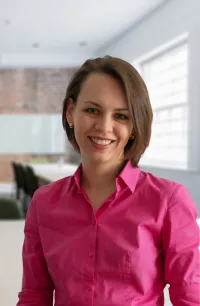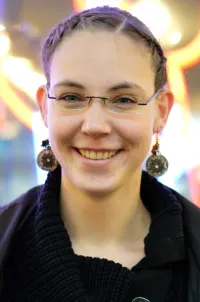
Serafima Sobinina studied Media Studies and English/American Studies in the Bachelor of Arts, 2-subject programme. This was followed by her Master of Arts degree Media Studies, 1 subject.
What made you choose this degree programme?
I chose my degree course more or less on the spur of the moment. My original plan was to pursue English studies. But because this degree course has to be studied in combinations with another other subject at RUB, I had to come up with a second option. I liked the description of the degree course, and I have been interested in films and series since I was a teenager; I even did some filming myself every now and then. I felt that media studies made a good combination with English studies. And now I am more than happy about my choice.
In which respect have or haven’t your expectations been fulfilled?
You learn a lot about the nature of media, their structure, and about media and especially film history. All this was great, seeing as I’m a film enthusiast. My understanding of films and other media products has improved.
Unfortunately, the degree course didn’t offer much in terms of practice. My expectations in that regard had been quite different. But after all: it’s all about media STUDIES, not about the creation of media. It’s important to be aware of this fact before opting to study this degree course. You will study a lot of theory; and there are a few practical seminars, but on the whole it’s up to you to find ways of getting hands-on experience.
Which aspect of your degree programme do you enjoy most?
As part of media studies, the field of game studies has been booming. And could there be anything better than combining your hobby with university?! Studying video games from the academic perspective has been a fascinating experience.
Another great aspect was: the almost entirely free choice of topics for term papers (which had to comply with the overall theme of the seminar, of course). For example, I had the opportunity to write a paper on one of my favourite games, namely Skyrim, for a gaming seminar, and another paper on the anime “Serial Experiments Lain” in the “Bewusstseinsräume und Seelenlandschaften im Film” (“spaces of consciousness and soul landscapes in film”) seminar . I had a lot of fun delving into these subjects.
What has been your biggest challenge to date?
The seminar on film theory according to Gilles Deleuze. It was incredibly demanding. Highly philosophical, very complicated texts – a whole book in fact – authored by the French philosopher Gilles Deleuze, which we studied in its entirety in the seminar. I had to make a presentation on the subject of self-reflection in film, and after reading the text for three hours, I had no idea what it said. Fortunately, I was able to ask my lecturer for advice and she helped me understand it. But it was very difficult, especially since I had to make a presentation about something that I did not at first understand.
What would you like to become after completing your degree?
I've been polishing my practical skills handling the camera and editing software through internships and I’m planning to pursue a career in this area. The future will show if I’ll end up working with an advertising agency, producing image films for clients and being involved in marketing campaigns, or if I’ll be working as a freelance contractor with a broadcasting company.
Which advice would you like to give to students who consider enrolling in this degree programme?
As member of the departmental student committee, one of my duties is to advise prospective students. The first thing I tell them is: you won’t be studying journalism, marketing, or media management. Reading and discussing texts makes up 70% of the degree course. It’s very important to consider all this before making the choice. First-year students often have unrealistic expectations of a degree course, and at the departmental student committee, we try to clear up the misunderstandings at the outset.



